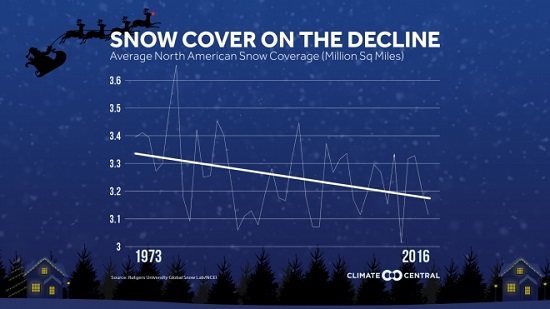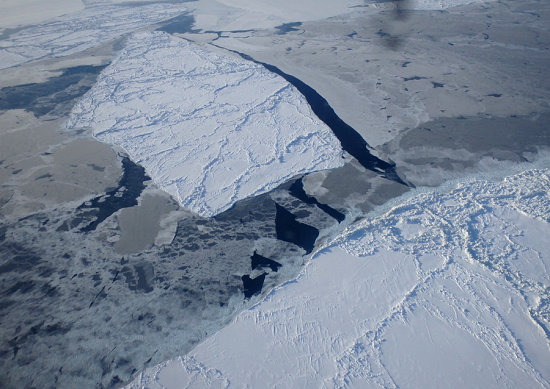Posted on 17 December 2017 by John Hartz
Story of the Week… Editorial of the Week… Toon of the Week… Graphic of the Week… Photo of the Week… SkS Spotlights… Reports of Note… Coming Soon on SkS… Poster of the Week… SkS Week in Review… 97 Hours of Consensus…
Story of the Week…
Here’s what’s at stake for the 21 kids suing the Trump administration over climate change
Arguments before the Ninth Circuit will decide whether the case goes to trial.
(Credit: Our Cchildren’s Trust)
On Monday (Dec 11), a group of 21 youth plaintiffs currently suing the federal government over climate change will go before a federal court to argue that their case — which legal experts have classified as a groundbreaking piece of climate litigation — should be allowed to proceed to trial.
On the other side of the court will be lawyers for the Trump administration, who will argue that the mere process of preparing for trial — sifting through decades of government documents and communication with fossil fuel companies, among other things — would constitute an overwhelming burden.
Ultimately, the Ninth Circuit Court of Appeals will decide whether the case can move forward to trial — a decision that could shape the future of climate litigation for years to come.
Here’s what’s at stake for the 21 kids suing the Trump administration over climate change by Natasha Geiling, Think Progress, Dec 11, 2017
Also see:
In Kids’ Climate Lawsuit, Judges Question Government Effort to Get Case Dismissed by Nicholas Kusnetz, InsideClimate News, Dec 11, 2017
Editorial of the Week…

Photo: Christophe Morin, Bloomberg
Lars Lokke Rasmussen, Denmark’s prime minister, left, and Jerry Brown, governor of California, arrive at the One Planet Summit in Paris, France, on Tuesday, Dec. 12, 2017. French President Emmanuel Macron hosts at least four world leaders, three mayors and the governor of California at an event in Paris on Tuesday aimed at breathing life into the global fight against climate change.
Though the Trump White House ignores climate change, the rest of the world isn’t neglecting the doomsday issue. A top-level gathering of global leaders in Paris is pushing ahead with plans to cool temperatures and shift economies at a hurry-up pace.
The meeting amounted to a two-fold jab at the White House. Everyone else is on board with an ambitious bid to cut weather-disrupting temperatures and switching to clean fuels. And, by the way, Trump is standing far outside the global mainstream on a turning point issue. To rub it in, France’s president and host adopted a not-so-subtle slogan: “Make Our Planet Great Again.”
For the record, the White House wasn’t invited. That rebuke was earned by the president’s decision to drop out of an international agreement reached in Paris two years ago to set goals and find the money to reduce the undeniable harm of rising atmospheric temperatures.
A global push on climate change thrives without Trump, Editorial Board Opinion, San Francisco Chronicle, Dec 15, 2017
Toon of the Week…

Graphic of the Week…

As the world warms, the overall area of North America covered by snow is decreasing. One reason is because an increasing percentage of winter precipitation is falling as rain instead of snow in many locations. A Climate Central report found that between sea level and 5,000 feet in elevation across the Western U.S., a smaller percentage of winter precipitation is falling as snow.
However, the relationship is more complex at each local level. Rising temperatures can cause some individual storms to produce more snow, where temperatures are still well enough below freezing. That’s because for every 1°F rise in temperature, the atmosphere can hold 4 percent more water vapor. In turn, more water is available to fall as snow or rain.
North American Snow Cover on the Decline, Climate Central, Dec 13, 2017
Photo of the Week…

Emmanuel Macron attends the Tech for Planet event in Paris, France Monday. Photograph: Philippe Wojazer/Reuters
Macron awards US scientists grants to move to France in defiance of Trump, AP/Guardian, Dec 11, 2017
SkS Spotlights…
In May 2000 all of the world’s science academies created the IAC to mobilize the best scientists and engineers worldwide to provide high quality advice to international bodies – such as the United Nations and the World Bank – as well as to other institutions.
In a world where science and technology are fundamental to many critical issues – ranging from climate change and genetically modified organisms to the crucial challenge of achieving sustainability – making wise policy decisions has become increasingly dependent on good scientific advice.
The IAC is client-driven and works on a project-by-project basis. It has developed mechanisms and procedures to guarantee the scientific quality of its reports, the policy-relevance of its recommendations and the absence of regional or national bias. The IAC collaborates closely with the IAP – the global network of science academies, the InterAcademy Medical Panel, the International Council of Academies of Engineering and Technological Sciences, and the International Council for Science. The IAC Secretariat is hosted by the Royal Netherlands Academy of Arts and Sciences (KNAW) in Amsterdam, The Netherlands.
Reports of Note…
Arctic Report Card: Lowest Sea Ice on Record, 2nd Warmest Year
Climate scientists say the magnitude and rate of sea ice loss this century is unprecedented in 1,500 years and issue a warning on the impacts of a changing climate.

Older Arctic sea ice is being replaced by thinner, younger ice. NOAA reports that multiyear ice accounts for just 21 percent of the ice cover in 2017. Credit: Thomas Newman/CICS-MD/NOAA
The Arctic experienced its second-warmest year on record in 2017, behind only 2016, and not even a cooler summer and fall could help the sea ice rebound, according to the latest Arctic Report Card.
“This year’s observations confirm that the Arctic shows no signs of returning to the reliably frozen state that it was in just a decade ago,” said Jeremy Mathis, director of the Arctic program at National Oceanic and Atmospheric Administration (NOAA), which publishes the annual scientific assessment.
“These changes will impact all of our lives,” Mathis said. “They will mean living with more extreme weather events, paying higher food prices and dealing with the impacts of climate refugees.
Arctic Report Card: Lowest Sea Ice on Record, 2nd Warmest Year by Sabrina Shankman, InsideClimate News, Dec 12, 2017
Coming Soon on SkS…
- One Planet Summit: Finance Commitments Fire-Up Higher Momentum for Paris Climate Change Agreement (UN Climate Change News)
- Climate research has beaten down the best climate denial argument (Dana)
- From the eMail Bag: Carbon Isotopes – Part 1 – The Basics (David Kirtley)
- Guest Post (John Abraham)
- New research this week (Ari)
- 2017 SkS Weekly Climate Change & Global Warming News Roundup #51 (John Hartz)
- 2017 SkS Weekly Climate Change & Global Waming Digest (John Hartz)
Poster of the Week…

SkS Week in Review…
97 Hours of Consensus…

Quote provided by email











